Erdogan's Re-election: a Prognosis
June 3, 2023 | Expert Insights

Recep Tayyip Erdogan has been a significant force in Turkish politics for nearly two decades. From 2003 to 2014, he served as prime minister, and since 2014, he has been President. During his tenure as President, he oversaw several significant changes in Turkey, including taming the powerful military, adopting a new constitution, expanding his powers, and a more assertive foreign policy.
The victory of Erdogan in the Turkish presidential election of 2023 was a significant surprise to many observers who were confident that the opposition coalition had finally reached the tipping point to dethrone him. His detractors were disappointed when Kemal Kilicdaroglu failed to win the requisite margin in the runoff, trailing behind with a massive deficit of nearly 5 per cent.
An ageing, visibly tired Erdogan, has many challenges to overcome as he prepares to launch his third tenure as the President.
Background
Looking back to the inception years of the Erdogan era, no one could have predicted that this average-looking individual would one day overtake Kemal Ataturk as Turkey's longest-serving leader, having shaped the nation over the past two decades in a way no other leader since the great Kemal Ataturk died at the relatively young age of 57 in 1938.
Mr Erdogan has undoubtedly achieved much during his long stint in power to qualify as Turkiye's most powerful leader since Mustafa Kemal. Though parts of the Western media have painted him as an autocrat, the Turkish President's record is mixed and includes some major achievements, as well as flawed decisions.
Turkey, like our neighbour Pakistan, has a long history of the military playing a dominating role in its politics and frequently toppling civilian governments to take power. Over the decades, the Turkish military has, directly and indirectly, sent four civilian governments packing. And like Pakistan, Türkiye shares the dubious distinction of sending an elected prime minister — Adnan Menderes — to the gallows.
Of course, the 2016 military coup was a turning point. When a section of the Turkish military tried to overthrow the government, President Erdogan successfully mobilised popular mass support to defeat the rebel troops, who, at best, comprised mostly of conscripts with little heart in the coup. Not surprisingly, the coup was swiftly defeated, allowing Erdogan to paint it as the 'second war of independence' in which Erdogan had rescued his country 'from the invasion of foreign powers.' The coup turned out to be 'a gift of God' (as called by Erdogan himself) as it established his historical standing. The AKP managed to checkmate the generals and ensure that they stayed within their constitutional bounds. The Turkish leader used the opportunity to make short work of his opponents, particularly members of the Gulenist movement, whom Mr Erdogan blamed for the aborted putsch. Tens of thousands were subsequently arrested and purged.
Mr Erdogan was also a major supporter of regime change in Syria, a policy that backfired and resulted in millions of Syrian refugees crossing into Türkiye.
On the economic front, Mr Erdogan has not achieved a great deal. Inflation is going through the roof, and the lira is plummeting, which means that the Turkish voter will expect solutions to resolve the painful economic crisis.
The victory of Erdogan is also an indication of the increasing polarisation in Turkish politics. On economic, foreign policy, and social issues, the two major parties, Erdogan's Justice and Development Party (AKP) and the Republican People's Party (CHP), are increasingly divided.

Analysis
Several variables contributed to Erdogan's victory in the Turkish presidential election 2023. Erdogan is a highly admired figure in Turkey. He enjoys a solid foundation of support among rural voters and devout Muslims. Second, many Turks find Erdogan's economic policies to be appealing. He has presided over economic expansion and increased social expenditure. Erdogan has also been able to exploit the divisions within Turkish society. He has utilised the concerns of Turkish nationalists and the support of religious conservatives in his campaign.
The implications of Erdogan's victory are significant for Turkey. Erdogan's victory will likely result in an expansion of his authority. He is currently the most powerful President in Turkish history, and his victory will probably grant him even more authority.
Likely, Erdogan's victory will further polarise Turkish society. On several issues, supporters and opponents of Erdogan are becoming increasingly divided, and Erdogan's victory is likely to exacerbate these divisions.
Erdogan has pledged to better the Turkish economy, which has struggled over the past few years. Nevertheless, his economic policies have been criticised by several economists, who assert that they have caused inflation and a decline in living standards. To what extent Erdogan will be able to strengthen the economy remains to be seen.
Erdogan, a Muslim fundamentalist, is likely to implement more conservative social policies, and this could include restrictions on the liberties of women and LGBT individuals.
In recent years, Erdogan has adopted a more assertive foreign policy stance, and his victory will likely encourage him to adopt an even more assertive stance. He has strengthened ties with China and Russia while criticising the United States and the European Union.
Erdogan is a controversial figure within NATO. He has criticised NATO's support for Kurdish militants in Syria and threatened to withdraw Turkey from the alliance. His objection to the inclusion of Sweden into NATO has been delaying the expansion of the bloc.
In recent years, Erdogan has been a significant actor in the Middle East. He has opposed the Syrian government and supported rebel factions in Syria and Libya. During his third term, Erdogan will undoubtedly play an important role in the Middle East.
Erdogan has been an outspoken critic of the European Union. He has accused the European Union of hypocrisy and of not doing enough to assist Turkey in addressing the Syrian refugee crisis. But with rising inflation and a falling economy, Erdogan needs business from the EU to meet the needs of his people. This could, hopefully, drive him to improve relations with Europe.
Erdogan's dalliance with Moscow has been a sour point with Washington, a long-term ally of Turkey since the cold war days. Today, President Biden and President Erdogan exchange bitter verbal barbs, which has not helped in reducing the widening gulf between Turkiye and the U.S.
Assessment
- Erdogan's victory in Turkey demonstrates his sustained popularity. Despite numerous obstacles, such as a struggling economy and an increasing number of adversaries, he has been able to maintain his support base.
- Into his third term, President Erdogan is a seasoned leader of global status and does not need cheap gimmicks or theatrics to secure his position in history. In fact, he is in a position to leverage his popularity at home and in the region to make substantive gains for his country. From here on, the Turkish leader should foster a climate of political reconciliation, both domestically and regionally, and focus on fixing the ailing economy.
- Erdogan's victory will likely result in a further consolidation of his power, a more assertive foreign policy, and a further polarisation of Turkish society. It remains to be seen how Erdogan will utilise his third term in office, but he will certainly remain a significant political force in Turkey.








Comments